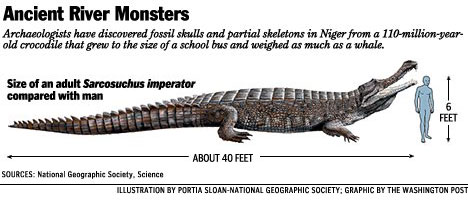Supercroc
“Son of man, take up a lamentation for Pharaoh king of Egypt, and say to him: ‘You are like a young lion among the nations, And you are like a monster in the seas, Bursting forth in your rivers, Troubling the waters with your feet, And fouling their rivers.’ “Thus says the Lord GOD: ‘I will therefore spread My net over you with a company of many people, And they will draw you up in My net. Then I will leave you on the land; I will cast you out on the open fields, And cause to settle on you all the birds of the heavens. And with you I will fill the beasts of the whole Land.” (Ezekiel 32:2-5)
The beast referred to might not be a modern-day crocodile. The sarcosuchus imperator (often called “Supercroc”) weighed up to ten tons, had a 1.8 metre long skull with over a hundred teeth, scales like roofing tiles, and a bulbous structure at the end of its snout with an enormous cavity under the nostrils. This could have been part of a biological mechanism to produce flames and smoke, like the bombadier beetle. If so, Supercroc is possibly the Leviathan of Job 41:18-21, a fire-breathing dragon.
Land beast
The Lord showed Job that He was not only the all-knowing architect of the universe, but also its all-powerful manager. He asked Job to look at Behemoth and Leviathan, not look them up in a book, which indicates that these huge animals still existed.
Based on their detailed descriptions, these two beasts were what we now call dinosaurs, and the Lord made the point that He was the only one who could control them, either with His sword, or by pulling them with a hook (40:19, 24). Behemoth was a huge marsh-dwelling land beast that answered to no one but God. He was the king of the Land, sustained by “springs of water.”
Sea beast
In the Creation account, the word used for “created” (as opposed to “made”) is only used of three things—the three most wonderful things: heaven and earth, man—and the great sea dragons. The sailors who drew such things on their maps saw these awe inspiring creatures. Leviathan was a sea beast that no one dared provoke. He was the king of the sea, and his description is terrifying (Job 41).
The Bible uses these great sea beasts as metaphors for Gentile nations, including Egypt and Babylon. This language was perfect to convey the hostility of the world under Satan, ready to rush over the boundaries of the Land like a flood of monsters from the deep.
One word used to describe these is also the word for “pride” (Rahab). As Leviathan was the king over all the “children of Rahab” (the other beasts, Job 41:34), so the “allies of Rahab” cower before God’s throne (Job 9:13). Like Solomon, the Lord has terrible beasts guarding His throne in heaven. Israel was His throne on earth, so the terrifying beast nations that surrounded Israel were there for her protection—until she disobeyed and He let them off the leash.


























